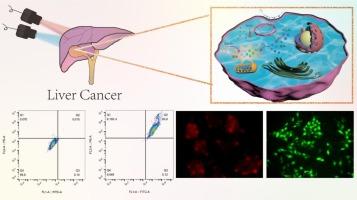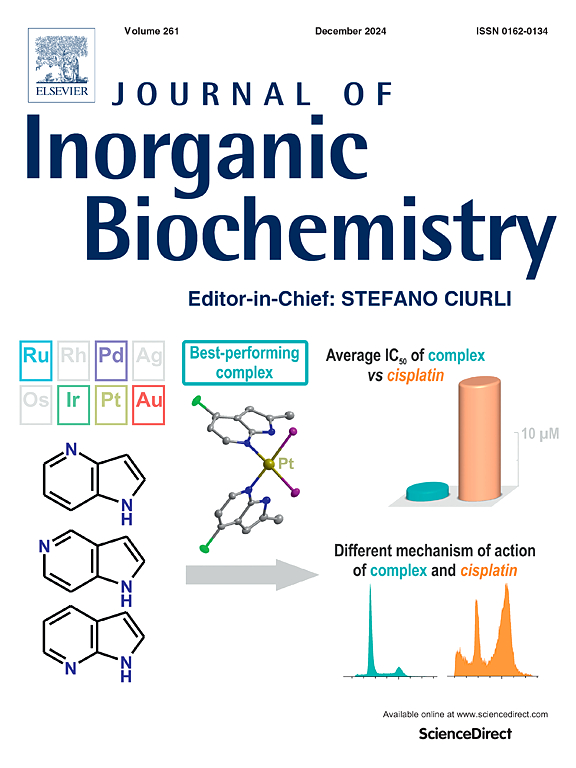Multifunctional Ru(III)/Fe3O4/DNA nanoplatform for photothermal-enhanced photodynamic and chemodynamic cancer therapy
IF 3.8
2区 化学
Q2 BIOCHEMISTRY & MOLECULAR BIOLOGY
引用次数: 0
Abstract
Among the many cancer treatment methods, there have been many reports on the use of nanoplatforms with single treatment methods such as photothermal, photodynamic or chemodynamic for cancer treatment. In this study, Ru(III) with photodynamic effect and Fe3O4 nanoparticles with photothermal and chemodynamic effects are connected through long DNA chains with efficient active targeting rolling circle amplification to construct Ru(III)/Fe3O4/DNA nano-platform realizes the combination of photothermal, photodynamic and chemodynamic treatment, which significantly improves the therapeutic effect of the nano-platform. Its multiple active targeting capabilities reduce the damage to normal cells. Ru(III) has excellent photodynamic effect and can catalyze the respiration product NADH (Nicotinamide adenine dinucleotide)to produce highly oxidizing H2O2. Fe3O4 NPs has weak absorption at 808 nm indicates that it can perform mild photothermal treatment, and the Fe2+ in it can react with H2O2 to produce ·OH and participate in chemodynamic treatment. Each repeating unit on the rolling circle amplified DNA long chain is connected to the AS1411 aptamer that can actively target cancer cells. Unlike the passive targeting of other nanomedicines, active and efficient targeting is achieved, and a small amount of drugs can achieve high efficacy. The therapeutic effect also reduces the damage to normal cells. The comprehensive killing effect of Ru(III)/Fe3O4/DNA can reach 85.1 %. Its high targeting of cancer cells can also be used for imaging detection of cancer cells. This new nanoplatform provides an idea for the synergy of multiple cancer treatments.

用于光热增强型光动力和化学动力癌症疗法的多功能 Ru(III)/Fe3O4/DNA 纳米平台
在众多癌症治疗方法中,利用光热、光动力或化学动力等单一治疗方法的纳米平台治疗癌症的报道很多。本研究将具有光动力效应的Ru(III)和具有光热和化学动力效应的Fe3O4纳米粒子通过具有高效主动靶向滚圆放大作用的长DNA链连接起来,构建了Ru(III)/Fe3O4/DNA纳米平台,实现了光热、光动力和化学动力治疗的结合,显著提高了纳米平台的治疗效果。其多重活性靶向能力可减少对正常细胞的损伤。Ru(III)具有良好的光动力效应,能催化呼吸产物 NADH(烟酰胺腺嘌呤二核苷酸)产生高氧化性 H2O2。Fe3O4 NPs 在 808 纳米波长处有微弱的吸收,表明它可以进行温和的光热治疗,其中的 Fe2+ 可以与 H2O2 反应生成-OH,参与化学动力学治疗。滚圆扩增 DNA 长链上的每个重复单元都与 AS1411 合体相连,可以主动靶向癌细胞。与其他纳米药物的被动靶向不同,它实现了主动高效靶向,少量药物就能达到很高的疗效。治疗效果还能减少对正常细胞的损伤。Ru(III)/Fe3O4/DNA 的综合杀伤效果可达 85.1%。它对癌细胞的高度靶向性还可用于癌细胞的成像检测。这种新型纳米平台为多种癌症治疗方法的协同作用提供了一种思路。
本文章由计算机程序翻译,如有差异,请以英文原文为准。
求助全文
约1分钟内获得全文
求助全文
来源期刊

Journal of Inorganic Biochemistry
生物-生化与分子生物学
CiteScore
7.00
自引率
10.30%
发文量
336
审稿时长
41 days
期刊介绍:
The Journal of Inorganic Biochemistry is an established international forum for research in all aspects of Biological Inorganic Chemistry. Original papers of a high scientific level are published in the form of Articles (full length papers), Short Communications, Focused Reviews and Bioinorganic Methods. Topics include: the chemistry, structure and function of metalloenzymes; the interaction of inorganic ions and molecules with proteins and nucleic acids; the synthesis and properties of coordination complexes of biological interest including both structural and functional model systems; the function of metal- containing systems in the regulation of gene expression; the role of metals in medicine; the application of spectroscopic methods to determine the structure of metallobiomolecules; the preparation and characterization of metal-based biomaterials; and related systems. The emphasis of the Journal is on the structure and mechanism of action of metallobiomolecules.
 求助内容:
求助内容: 应助结果提醒方式:
应助结果提醒方式:


